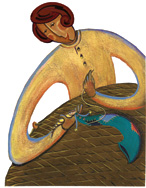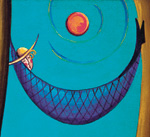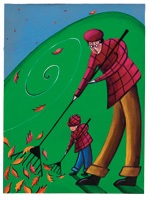 Check with your doctor if you experience a troubling change in how you feel. Symptoms that might seem like the menopausal transition, even hot flashes, night sweats, and irregular periods, may have other causes.
Check with your doctor if you experience a troubling change in how you feel. Symptoms that might seem like the menopausal transition, even hot flashes, night sweats, and irregular periods, may have other causes.
Menopause is a natural stage of life. It is not something that you must take medicine for. If your doctor says you are in the menopausal transition and the symptoms are not bothering you, you don’t have to do anything about them. If your symptoms are making you very uncomfortable, there are things you can do to relieve your discomfort. Your treatment should be chosen based on your own symptoms and health risks. What your sister or friend does may not be the right choice for you. Talk to your doctor about the best approach for you.
Whatever approach you choose, if you decide to treat your menopausal symptoms, remember that it is not a permanent decision. At every checkup, talk with your doctor about your symptoms or concerns. Find out if there have been any new research findings or different treatments. If you are using menopausal hormone therapy, maybe you need a higher dose for more relief, or maybe you want to try a lower, perhaps safer dose. Discuss whether you still need to treat your menopausal symptoms.
HOT FLASHES AND NIGHT SWEATS
| |
|
What is relaxation breathing? |
| Deep breathing, relaxation breathing, and paced respiration all refer to a method used to reduce stress. It involves breathing in (inhaling) deeply and breathing out (exhaling) at an even pace. Do this for several minutes while in a comfortable position. You should slowly breathe in through your nose. With a hand on your stomach right below your ribs, you should first feel your stomach push your hand out, and then your chest should fill. Slowly exhale through your mouth, first letting your lungs empty and then feeling your stomach sink back. You can do this almost anywhere and several times during the day, whenever you feel stressed. You can also try this if you feel a hot flash beginning or if you need to relax before falling asleep. | |
If hot flashes and/or night sweats are interfering with your daily activities, don’t hesitate to seek relief. There are some practical steps you can try to ease hot flashes and/or night sweats:
- Sleep in a cool room.
- Dress in layers, which can be removed at the start of a hot flash.
- Have a drink of cold water or juice when you feel a hot flash coming on.
- Use sheets and clothing that let your skin “breathe.”
- Don’t smoke.
You could try to keep a written record of what you were doing just before a hot flash started. This might reveal some triggers for your hot flashes which you could then try to avoid.
There are also lifestyle changes you can try. Exercise can improve your quality of life and may help with hot flashes. It will also help reduce your risk of heart disease and osteoporosis. Stopping smoking and losing weight might lower your risk of hot flashes. Studies in small groups of women suggest that slow, deep breathing, known as relaxation breathing, may also help reduce hot flashes.
Your doctor might recommend certain prescription medicines to help manage hot flashes. For example, studies suggest that gabapentin, a medicine used for epilepsy, pain, and some mood disorders, might ease hot flashes in some women. There are a few antidepressants that might also help, even if you aren’t depressed or don’t have mood problems. However, none of these drugs have been approved by the U.S. Food and Drug Administration (FDA) for relieving hot flashes, and there are many questions that scientists are still working on answering.
More than sixty years ago, experts found that giving estrogen to a woman going through the menopausal transition could relieve some of the annoying symptoms like hot flashes. Estrogen remains the most effective medicine approved by the FDA for hot flashes, night sweats, and vaginal dryness. But, now we know that a few women who use estrogen may develop serious health problems as a result. This approach, now known as menopausal hormone therapy (MHT), used to be called hormone replacement therapy or HRT.
|
What about hormones for symptoms of menopause? |
|
 Menopausal hormone therapy (MHT) uses hormones to ease the symptoms of menopause or to prevent osteoporosis. The hormones are estrogen alone for a woman who no longer has her uterus or estrogen with progesterone or a progestin (a progesterone-like medicine) for a woman with a uterus. When a woman is taking estrogen, progesterone or a progestin is needed to protect the lining of the uterus, the endometrium. This lowers the chance of unwanted endometrial thickening and of endometrial cancer, an uncommon, but possible result of using estrogen alone. Menopausal hormone therapy (MHT) uses hormones to ease the symptoms of menopause or to prevent osteoporosis. The hormones are estrogen alone for a woman who no longer has her uterus or estrogen with progesterone or a progestin (a progesterone-like medicine) for a woman with a uterus. When a woman is taking estrogen, progesterone or a progestin is needed to protect the lining of the uterus, the endometrium. This lowers the chance of unwanted endometrial thickening and of endometrial cancer, an uncommon, but possible result of using estrogen alone.
Estrogen and progesterone/progestin come in many different forms—pills, creams, or skin patches, for example—and a variety of types and doses. The FDA recommends that MHT be used at the lowest dose that relieves symptoms for the shortest time needed.
Similar to the effect of using low-dose birth control pills before menopause, using menopausal hormone therapy before your last period can make it difficult to know when menopause has occurred. That is, you might continue to have a period because of the hormones you are taking even after your ovaries are no longer making estrogen and progesterone.
If you have had a hysterectomy with your ovaries removed also, your doctor might suggest that you start using estrogen right after the operation. This may prevent hot flashes and other symptoms. If, later, you decide to stop using estrogen, however, bothersome menopausal symptoms could still start, even years after the surgery.
Many women find MHT relieves their menopausal symptoms, but not all women should use this therapy. If you are considering using MHT for troublesome menopausal symptoms or to prevent osteoporosis, you can read an up-to-date discussion of MHT, including the benefits and risks of both MHT and bioidentical or natural hormones, in the Hormones and Menopause tip sheet from the National Institute on Aging (NIA). Contact the NIA Information Center, listed in For More Information, for a free copy. |
MENSTRUAL CYCLE PROBLEMS
 If you are having a problem with heavy bleeding during your period, your doctor might suggest that you use a low-dose birth control pill. This will make your menstrual cycle and flow more regular, prevent pregnancy, and help with hot flashes. However, using the pill could make it hard for you to know when you have reached menopause—you will probably continue to have periods, even after your ovaries are no longer making estrogen and progesterone, because of the hormones in the pills. If you are the right age for menopause, you might need to stop the birth control pill for 12 months to see whether or not you have a period. If you don’t want to become pregnant during that time, you will need to use some other method of birth control.
If you are having a problem with heavy bleeding during your period, your doctor might suggest that you use a low-dose birth control pill. This will make your menstrual cycle and flow more regular, prevent pregnancy, and help with hot flashes. However, using the pill could make it hard for you to know when you have reached menopause—you will probably continue to have periods, even after your ovaries are no longer making estrogen and progesterone, because of the hormones in the pills. If you are the right age for menopause, you might need to stop the birth control pill for 12 months to see whether or not you have a period. If you don’t want to become pregnant during that time, you will need to use some other method of birth control.
VAGINAL DRYNESS
Vaginal dryness can be very uncomfortable and may get in the way of a normal sex life. A water-based lubricant, but not petroleum jelly, may relieve your vaginal discomfort.
The hormone estrogen can also help with vaginal dryness. Women who are using MHT—a patch or pill, for example—for hot flashes should also find relief from their vaginal dryness. For women who are only bothered by vaginal symptoms, inserting a vaginal estrogen tablet or vaginal ring containing estrogen or applying an estrogen cream in the vagina will probably relieve symptoms locally. With estrogen cream, some of the estrogen may enter your bloodstream from the vagina and travel elsewhere in your body as estrogen does before menopause or when you swallow an estrogen pill or use an estrogen patch. We don’t know if estrogen cream could relieve hot flashes or cause serious side effects. Both seem to be less likely with a vaginal estrogen tablet, which has a lower dose of estrogen.
SLEEP PROBLEMS
Because different things can cause sleep problems, the solutions vary. If night sweats are disrupting your sleep, treating them could help you sleep better. If you find yourself getting up to go to the bathroom, try limiting fluids shortly before bedtime unless you need a cool drink to handle a hot flash. If you aren’t sure what is keeping you from getting to sleep or causing you to wake during the night or early in the morning, there are still some things you can do to get a good night’s sleep.
- Be physically active most days of the week but not within 3 hours of bedtime.
- Go to bed and get up at the same time every day, even on weekends, and avoid naps, if possible, in the late afternoon and evening.
- Have a bedtime routine that you follow each night—read a book or magazine, take a bath, watch television.
- Make sure your bedroom and bed are comfortable for sleeping.
- Don’t eat a large meal close to bedtime, and stay away from caffeine later in the day.
- After turning off the light, give yourself about 15 minutes to fall asleep. If you don’t go to sleep, get out of bed, and only go back when you feel sleepy.
- Try relaxation breathing (see box above).
|
Do dietary supplements help? |
|
 Many people use dietary supplements hoping to improve their nutrition and/or health. Maybe you wonder whether you should use a supplement, such as soy, black cohosh, or wild yam, to relieve your hot flashes instead of using menopausal hormone therapy. Many people use dietary supplements hoping to improve their nutrition and/or health. Maybe you wonder whether you should use a supplement, such as soy, black cohosh, or wild yam, to relieve your hot flashes instead of using menopausal hormone therapy.
According to the FDA, dietary supplements are products taken by mouth that contain a “dietary ingredient” intended to add to or supplement the diet. These may seem safe because they might come from plants and are “natural.” But the truth is we don’t know enough about these supplements to know whether they are indeed safe and if they will really ease menopausal symptoms. Supplements are not medicines. They are sold without getting FDA approval for safety and effectiveness as is required for prescription or over-thecounter medicines.
Some herbal substances can have very serious, possibly fatal side effects, like liver damage. And some just don’t work as they claim. In 2006 a large, one-year study of black cohosh showed that it did not relieve hot flashes in women approaching menopause.
Plants like soy contain estrogen-like substances called phytoestrogens. Scientists don’t know whether phytoestrogens carry the same benefits and risks as prescription estrogens, some of which are made from plants like soy.
Learn as much as you can about a dietary supplement before trying it. Some supplements can change how other medicines work by increasing or weakening their effect. Talk to your doctor before using any supplements, and make sure he or she knows everything you are taking, even vitamins and minerals. |
<< Back | Next >>
